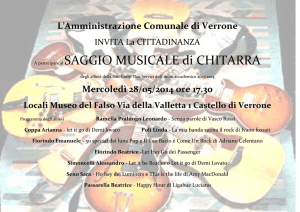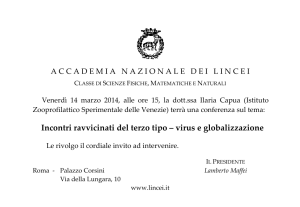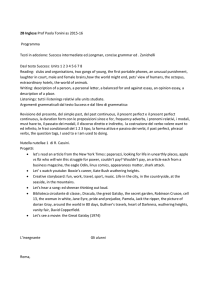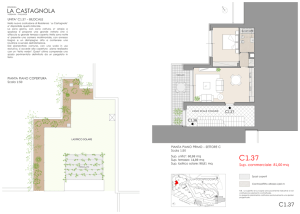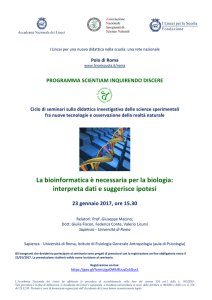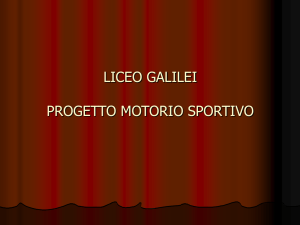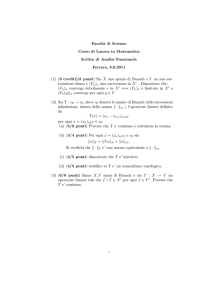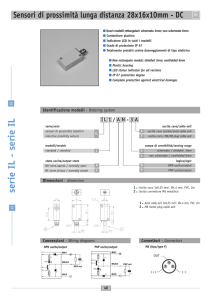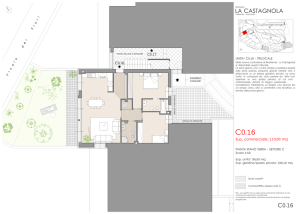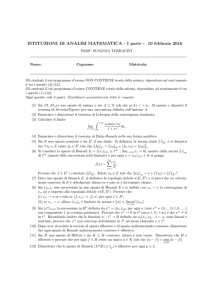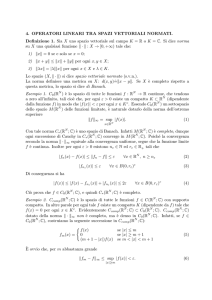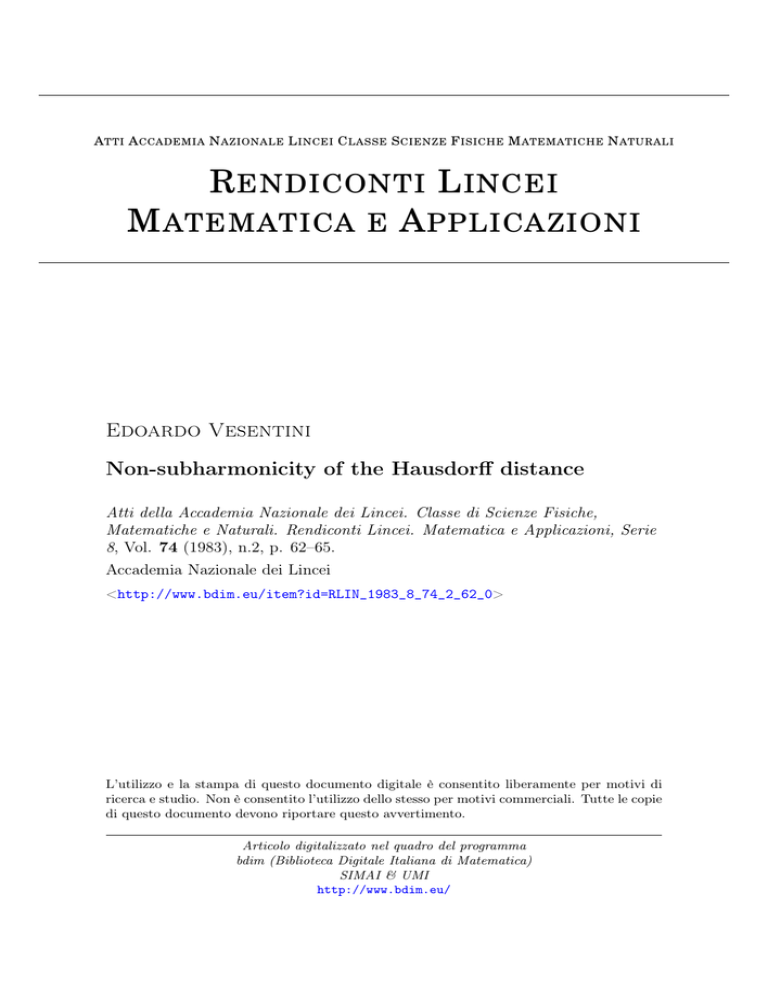
A TTI A CCADEMIA N AZIONALE L INCEI C LASSE S CIENZE F ISICHE M ATEMATICHE N ATURALI
R ENDICONTI L INCEI
M ATEMATICA E A PPLICAZIONI
Edoardo Vesentini
Non-subharmonicity of the Hausdorff distance
Atti della Accademia Nazionale dei Lincei. Classe di Scienze Fisiche,
Matematiche e Naturali. Rendiconti Lincei. Matematica e Applicazioni, Serie
8, Vol. 74 (1983), n.2, p. 62–65.
Accademia Nazionale dei Lincei
<http://www.bdim.eu/item?id=RLIN_1983_8_74_2_62_0>
L’utilizzo e la stampa di questo documento digitale è consentito liberamente per motivi di
ricerca e studio. Non è consentito l’utilizzo dello stesso per motivi commerciali. Tutte le copie
di questo documento devono riportare questo avvertimento.
Articolo digitalizzato nel quadro del programma
bdim (Biblioteca Digitale Italiana di Matematica)
SIMAI & UMI
http://www.bdim.eu/
62
Atti Acc. Lincei Rend, fis. - S. V i l i , voi. LX X IV , 1983, fase. 2
Geom etria. — Non-subharmonicity of the Hausdorjf distance. Nota W
del Corrisp. E doardo Y esentini.
R iassunto. — Si dimostra con esempi che la distanza di Hausdorff-Carathéodory
fra i valori di funzioni multivoche, analitiche secondo Oka, non è subarmonica.
Let D be a bounded domain of C, and let c be the Carathéodory distance
on D. According to Theorem I of [5], the function {x,y)
log c (x , y) is plurisubharmonic on D X D. Thus, for any domain U of C and for all holomorphic
maps / , g of U into D, the function £ i-> log c ( / ( £ ) , g (£)) is subharmonic
on U.
Let / , g be analytic set-valued functions on U, in the sense of K. Oka [2, 3],
taking their values in the family of all compact subsets of D. Let hd and hc be
the Hausdorff distances between subsets of D, defined respectively in terms of
the euclidean distance d on C and of the Carathéodory distance c on D: for
H 'c = D (/= l,2 ),
hd (H1, H2) = max {sup {d (z , H2) : z e H1} , sup {d (H1, z) : z e H2}} ,
h c (H1, El2) = max {sup {c (z , EL) : z e H1} , sup {c (H1, z) : z e H2}} ,
where
d (z , EL) = d (EL, z) = inf { | z — u | : u e H>'} ,
c (2 :, EL) — c (H^, z) = inf {c (z ,u) : u e H^} ,
(/ = 1 ,2 ).
The question arises whether the functions C ^ hA( / ( Q , g (£)) ,
^
,g (Q), are subharmonic on U. The present paper will provide a
negative answer to this question, contrary to a statement added in proof to [6].
The basic tool will be a result of [3], whereby for any complex Banach algebra
A and any holomorphic map F : U
A the function / : £ i-> Sp F (£), mapping
C e U onto the spectrum Sp F (£) of F (£), is Oka-analytic. Let F be such that
Sp F (£) c= D for all ^ e U . Examples will be constructed showing that, for
some compact set K c D, both the functions
(1)
SpF(Q,K)
,
SpF(0,K)
are not subharmonic on U.
This fact entails that Theorem I of [4]
—which is a consequence of Theorem I of [5]—does not extend to Okaanalytic functions.
(#) Presentata nella seduta del 12 febbraio 1983.
63
Edoardo V esen tin i, Non subharmonicity of the Hausdorff distance
1. For s > r > 0, let
C (r, $) = {# e C : r < | s | < $}
,
A (r) — {z e C : | # | < r) .
In nn. 1, 2, U will be the unit disc A=;A(1). Let A = /°°, the commu­
tative unital complex Banach algebra of all bounded sequences x — {xn) of
complex numbers xn {n=- 0 , 1 , •••) with component-wise addition and mul­
tiplication, and with norm ||a?|| = ; sup | xn \ . Let a — {an\ and b ~ { b n} be
dense, respectively, in A
j and C
, —j .
Then Sp b = C 4 ’ -2I/
and, for the holomorphic map £ i-> X,a of A into Z°°, Sp X^a — A y - J . For
any £ e A
hd (Sp & , Sp b) = max Q - , — ----- — j •
Thus,
hd (Sp Za , Sp b) =
1
2
hd (Sp Za , Sp b) =
1
4
1Cl
3
if U l < ^ ,
if - < \ z \ < l
Hence the continuous non-constant function £
hd (Sp Xsa , Sp £), which
reaches its maximum on A at X, = 0, is not subharmonic on A.
2.
The above example will now be suitably modified so as to provide
an example of a non-subharmonic function defined in terms of h c.
If the domain D is the unit disc A, the Carathéodory distance c coin­
cides with the Poincaré distance
<*>(#i »*2) =
1_
log 1 + [* i, *J 1
2
1 [%i, #2]
where
[*1
>* 2] =
^1 — ^ 2
(*i, 32e A)-.
l — z 1z2
It is well known that the function (s* , z 2) i~> [%, #2] defines a distance
on A, and it is easily checked that co (z1, z 2) is a strictly increasing function of
[#1 >^ 2] f°r z i and z 2 in A.
The geodesic lines through the center 0 of A for
the Poincaré metric are the radii of the disc A. These facts, coupled with
the invariance of Sp b under rotations around 0, imply that, for
1*1
< —,
64
Atti Acc. Lincei Rend, fis. - S; V i l i , voi. LX X IV , 1983, fase. 2
the distance [z , Sp b \ ~ [Sp b ,%]= inf {[z , u] : u e Sp 6} between z and Sp b
is given by
[* » SP bì
=*
[l * I. -£-] •
Therefore, for £ e A,
(2)
sup {[# , Sp 6] : # e Sp X,à) = £o , - y j = — .
Similarly, for £ e A,
(3)
sup {[* , Sp Za] : z e Sp b} = [ i | i , -1 ] = - ^ = ^ 1 •
Comparison of (2) and (3) shows that
h e (Sp Za , Sp 6) =
36~
^ --
if
/ic ( S p ^ , S p 6 ) = -
\Z \<
y
>
if y < K I < 1 -
Hence the continuous, non-constant function £ i->Ac (Sp£tf, Sp b) on A,
which reaches its maximum at £ = 0, is not subharmonic.
3.
Examples of holomorphic maps into a non-commutative Banach
algebra will now be constructed, for which the functions (1) are not upper
semicontinuous.
For any p such that 1 < p < oo, let lv (— oo, + oo) be the complex Banach
space of all bilateral sequences x — {x^ of complex numbers xn (n e Z) with
the norm
11*11=(SI * IT*.
Let A be the unital complex Banach algebra of all bounded linear opera­
tors on F (— oo , + oo), and let T , S be the elements of A defined on the
canonical basis {en} of F (— oo , oo) by
Te0 =s 0 ,
Se0 =
,
Ten = en_t
for all n =£ 0 ,
Se„ = 0
for all n ^ 0 .
Let F ^ C
A be defined by F ( C ) = = T + ^ S .
Then [1; p. 210]
Sp F (0) = A , Sp F (£) = dA = {# e C : | z \ — 1} if £ ^ 0.
Therefore
hd (Sp F (£), Sp T) = 1
hd (Sp F (0) , Sp T) = 0 .
forali
£^ 0,
Edoardo V esen tin i, Non subharmonicity of the Hausdorff distance
65
That shows that £
hd (Sp F (£), Sp T) is not upper semicontinuous.
The above example can be adapted to the Poincaré distance on A. Choose
G(0 = i F ( 0 .
Then
h c (Sp G (£), Sp G (0)) — « ( 0 , 1)
whenever £ 7 ^ 0, showing that £ 1—> h c (Sp G (£), Sp G (0)) is not upper semi­
continuous.
B ibliografia
[1] T . K ato (1966) - Perturbation theory for linear operators, Springer-Verlag, BerlinHeidelberg - N ew York.
[2] K. O ka (1934) - Note sur les families defonctions analytiques multiformes etc., « J. Science
Hiroshima Univ. », 4, 93-98.
[3] Z. S lodk ow ski (1981) - Analytic set-valued functions and spectra, «Math. Ann.»,
256, 363-386.
[4] E. V esen tin i (1979) - Variations on a theme of Carathéodory, «Ann. Scuola Norm.
Sup. Pisa », (4) 7, 39-68.
[5] E. V esen tin i (1982) - Complex geodesics and holomorphic maps, «Symposia Mathema­
tica», X X V I, 211-230.
[6] E .V esen tin i (1983) - Carathéodory distances in Banach algebras, «Advances in Math.»,
47, 50-73.
5. — RENDICONTI 1983, voi. LXXIV, fase. 2.

